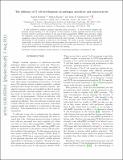The influence of T cell development on pathogen specificity and autoreactivity
Author(s)
Kosmrlj, Andrej; Kardar, Mehran; Chakraborty, Arup K.
DownloadChakraborty_Influence of T.pdf (646.0Kb)
OPEN_ACCESS_POLICY
Open Access Policy
Creative Commons Attribution-Noncommercial-Share Alike
Terms of use
Metadata
Show full item recordAbstract
T cells orchestrate adaptive immune responses upon activation. T cell activation requires sufficiently strong binding of T cell receptors on their surface to short peptides derived from foreign proteins bound to protein products of the major histocompatibility (MHC) gene products, which are displayed on the surface of antigen presenting cells. T cells can also interact with peptide-MHC complexes, where the peptide is derived from host (self) proteins. A diverse repertoire of relatively self-tolerant T cell receptors is selected in the thymus. We study a model, computationally and analytically, to describe how thymic selection shapes the repertoire of T cell receptors, such that T cell receptor recognition of pathogenic peptides is both specific and degenerate. We also discuss the escape probability of autoimmune T cells from the thymus.
Date issued
2012-10Department
Institute for Medical Engineering and Science; Massachusetts Institute of Technology. Department of Biological Engineering; Massachusetts Institute of Technology. Department of Chemical Engineering; Massachusetts Institute of Technology. Department of Chemistry; Massachusetts Institute of Technology. Department of Physics; Ragon Institute of MGH, MIT and HarvardJournal
Journal of Statistical Physics
Publisher
Springer-Verlag
Citation
Košmrlj, Andrej, Mehran Kardar, and Arup K. Chakraborty. “The Influence of T Cell Development on Pathogen Specificity and Autoreactivity.” Journal of Statistical Physics 149.2 (2011): 203–219.
Version: Author's final manuscript
ISSN
0022-4715
1572-9613